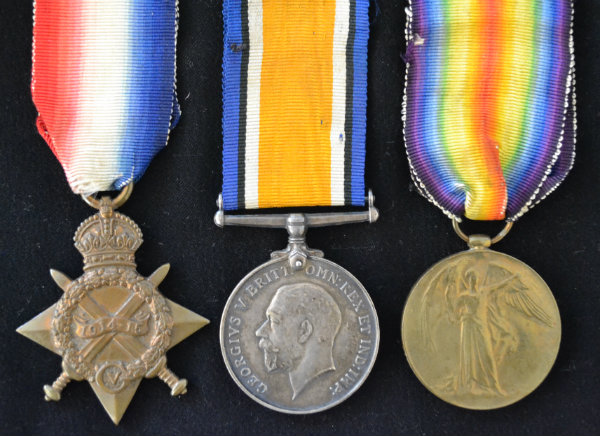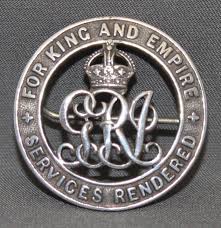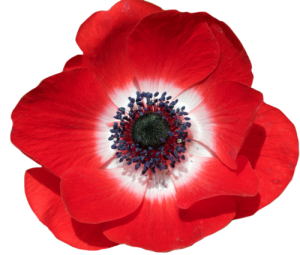Personal Details
Baptised in Whitchurch, Shropshire 22nd May 1895, Arthur Toplady Powell was the youngest of eight children and the only son of Harriet Emma Powell and the late William Arthur Powell of 24 Dodington, Whitchurch, Shropshire. The family later lived in Wrexham Road and then Talbot Street.
In 1911 Arthur worked as a clerk in an estate office and lived in Bridlington Road, Sledmere, Yorkshire prior to enlisting.
Arthur was wounded in France which resulted in the amputation of his right arm. He was discharged from the Army in 1916, fitted with a prosthetic arm and retrained as left handed. He contracted tuberculosis and died in Bournemouth early November 1920.
Military Details
Regiment : 5th Battalion Alexandra, Princess of Wales’s Own Yorkshire Regiment
Rank : Lance Sergeant
Service Number : 1173
Died of illness; UK November 1920 aged 25
Not commemorated by the Commonwealth War Grave Commission

The 1914 Star (also known as 'Pip') was authorised under Special Army Order no. 350 in November 1917 and by an Admiralty Fleet Order in 1918, for award to officers and men of the British and Indian Expeditionary Forces who served in France or Belgium between 5 August and midnight of 22–23 November 1914. The former date is the day after Britain's declaration of war against the Central Powers, and the closing date marks the end of the First Battle of Ypres.
The 1914–15 Star (also known as 'Pip') was instituted in December 1918 and was awarded to officers and men of British and Imperial forces who served against the Central European Powers in any theatre of the Great War between 5 August 1914 and 31 December 1915. The period of eligibility was prior to the introduction of the Military Service Act 1916, which instituted conscription in Britain.
The British War Medal (also known as 'Squeak') was a silver or bronze medal awarded to officers and men of the British and Imperial Forces who either entered a theatre of war or entered service overseas between 5th August 1914 and 11th November 1918 inclusive. This was later extended to services in Russia, Siberia and some other areas in 1919 and 1920. Approximately 6.5 million British War Medals were issued. Approximately 6.4 million of these were the silver versions of this medal. Around 110,000 of a bronze version were issued mainly to Chinese, Maltese and Indian Labour Corps. The front (obv or obverse) of the medal depicts the head of George V. The recipient's service number, rank, name and unit was impressed on the rim.
The Allied Victory Medal (also known as 'Wilfred') was issued by each of the allies. It was decided that each of the allies should each issue their own bronze victory medal with a similar design, similar equivalent wording and identical ribbon. The British medal was designed by W. McMillan. The front depicts a winged classical figure representing victory. Approximately 5.7 million victory medals were issued. Interestingly, eligibility for this medal was more restrictive and not everyone who received the British War Medal ('Squeak') also received the Victory Medal ('Wilfred'). However, in general, all recipients of 'Wilfred' also received 'Squeak' and all recipients of The 1914 Star or The 1914/1915 Star (also known as 'Pip') also received both 'Squeak' and 'Wilfred'. The recipient's service number, rank, name and unit was impressed on the rim.

The Silver War Badge was issued in the United Kingdom and the British Empire to service personnel who had been honourably discharged due to wounds or sickness from military service in World War I. The badge, sometimes known as the "Discharge Badge", the "Wound Badge" or "Services Rendered Badge", was first issued in September 1916, along with an official certificate of entitlement.
Further Information
There are a series of articles in the Whitchurch Herald chronicling the wounding and eventual death of Arthur T Powell:
8/5/1915 is a letter home having just arrived at the trenches
12/6/1915 records his initial wounding in the right arm (not thought to be serious)
26/6/1915 records his arm being amputated
3/7/1915 corrects some details in the previous article
These are then followed by the following three articles:
Report in the Whitchurch Herald recording the rehabilitation of Arthur Toplady Powell following the amputation of his right arm and his training to write left handed
“ Lance Sargeant Arthur T Powell, son of Mrs Powell Talbot Street, who it will be remembered lost his right arm below the elbow as a result of a wound received in France recently went up to Roehampton House Convalescent Hospital. This building was formerly the residence of Mr Kenneth Wilson but is now used as a hospital for soldiers with lost limbs. Sergeant Powell was there for a few days when he was discharged for 3 months pending the making of his artificial arm. He is now staying in London and taking lessons in left hand writing, typing and shorthand at Clarke’s College. His tutor also goes to Roehampton House to give classes there and on Friday last week when the King and Queen were visiting the hospital he took with him specimens of Sergt Powell’s handwriting and shorthand to show their majesties. The King was very much surprised by them both and said he could hardly credit it.”
Whitchurch Herald 25 March 1916
Report in the Whitchurch Herald regarding the death of Arthur Toplady Powell
“We deeply regret to announce the death of Mr Arthur Toplady Powell only son of Mrs W. A. Powell and the late Mr W. A. Powell who was for some years stationed at Whitchurch as Inland Revenue Officer and afterwards at Fort William.
Mr Arthur Powell was nearly 26 years of age. He was a lad of great ability and promise and of a genial disposition which endeared him to all with who he came into contact. After a short time in an estate agency office he joined the army soon after the outbreak of war and quickly rose to the rank of Lance Sergeant but was wounded in action and this subsequently necessitated the amputation of his right arm. He underwent training to fit himself for the earning of his livelihood under the new conditions and bore his disabilities with great fortitude and cheerfulness. His health however broke down and tuberculosis supervened; and in spite of all that could be done his condition became gradually worse and he died in a Nursing Home at Bournemouth on Friday at noon and the internment took place in the same town on Monday.
It is needless to say that the utmost sympathy is extended to the relatives in their singularly sad bereavement.
In view of the fact that the late Mr Arthur Powell undoubtedly lost his life through his war services it is worth suggesting that his name might well be inscribed on the War Memorial which was unveiled on Thursday.”
Whitchurch Herald 13 November 1920
Report in the Whitchurch Herald recording the decision of the Whitchurch War Memorial Committee at its wind up meeting
“Additional names to be placed upon the Memorial - Arthur Powell, Matthew John Powell, Charles Jones. Matthew John being a doubt as to whether this man’s name might not be placed on the Tilstock Memorial.”
Whitchurch Herald 30 April 1921
If you can provide any further information on Arthur Toplady Powell please get in touch by leaving a comment below, using our Contact Form or by calling in to Whitchurch Heritage Centre.
Information provided by Whitchurch Museum and Archives

